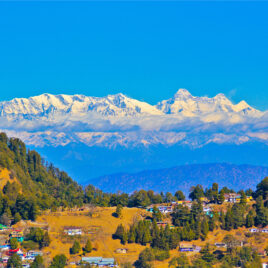This blog is part 2 in the two part series written by Dr Miles Neale. You can read part 1 here.
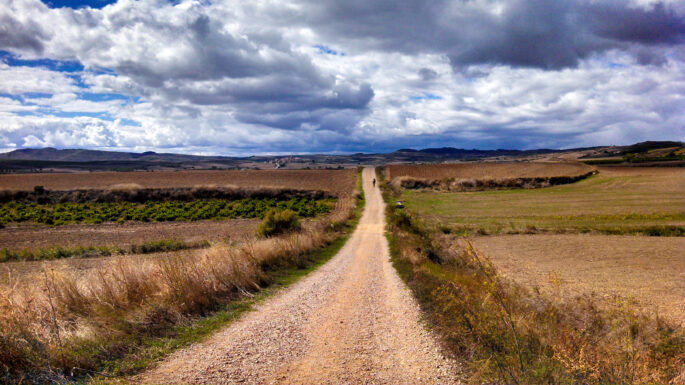
Physical Benefits
At first glance, pilgrimage might seem like a purely spiritual exercise, but the physical demands of walking for days, or even weeks, are substantial. Walking long distances is not only beneficial for cardiovascular health but also has a grounding, meditative quality. The rhythm of walking—step after step, day after day—helps quiet the mind and allows for a deep focus that can be rare in modern, busy life. In the Tibetan tradition, preliminary practices include 100,000 prostrations, with their physical benefits and rhythmic cadence being well articulated.
Moreover, being immersed in nature, whether in the lush forests and natural springs of the Kumano Kodo or the wide-open plains and rolling hills in the heartland of northern Spain, helps reset the body’s circadian rhythms and reduce stress. Numerous studies have shown that time spent in nature can reduce cortisol levels and boost overall well-being.
Psychological Benefits
On a psychological level, pilgrimage provides the opportunity for deep reflection and self-inquiry. The quiet space away from the demands of work, family, and technology allows for thoughts, emotions, and memories to surface—some of which may have been long suppressed, perhaps even for good reason. Now, on pilgrimage, the context is rendered safe, like in psychotherapy, by the consciousness and care of willing participants, who volunteer to support one another’s ‘regression in the service of growth’. As I like to say, in therapy, psychedelics, and pilgrimage, sometimes ‘we have to go back (to reclaim long-lost fragments of ourselves) in order to move forward, more whole. In this way, pilgrimage can act as a vehicle for psychological healing, encouraging the kind of introspection and integration that leads to emotional growth and greater resilience.
Spiritual Benefits:
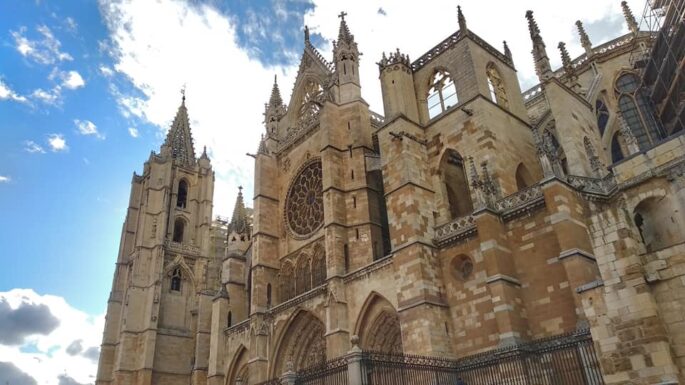
Both the Kumano Kodo and Camino de Santiago are infused with spiritual significance, and for many pilgrims, walking these routes is a way of deepening their connection with the divine, by whatever name. Yet, even for those who do not identify with a particular faith tradition, pilgrimage offers an opportunity to connect with something greater than oneself. Whether that’s God, one’s guru, nature, wonder, or the collective human spirit, the act of pilgrimage transcends the individual and taps into universal themes of soul-seeking, transformation, renewal, and altruism for the benefit of others.
I recount many extraordinary transpersonal experiences in Return with Elixir: visions, synchronicities, dreams, visitations, and the like. I don’t boast about them, or I claim to possess any special authority. I chose to discuss them precisely because I think they are more common and more human than people feel safe to admit. As we recalibrate from our overly materialistic paradigm to include more of our lost spiritual sensibilities, I anticipate “non-ordinary” or extra-sensory experiences will become more commonplace.
Communal Benefits:
One of the most unexpected gifts of pilgrimage is the sense of community that emerges along the way. In a world where loneliness and isolation are becoming increasingly common, pilgrimage offers an antidote. Whether it’s the simple act of sharing a meal with fellow pilgrims or engaging in deep, heartfelt conversations with strangers along the path—or as we did in 2022 when our group danced and sang aloud with a blaring loudspeaker in the aisle of the bus at night en route from Varanasi to Bodhgaya, India, where Buddha gained enlightenment—the connections formed on pilgrimage are often deep and long-lasting. “This is how we roll into Bodhgaya,” I said to the gang proudly, perhaps a historic first!
In the case of the Camino de Santiago, I’ve read and heard the communal experience is particularly profound. Pilgrims from all over the world, from every walk of life, come together to walk and endure together the same challenging path. Differences among us, though important, are held within a collective field of shared humanity and solidarity. Can you think of anything more important today to heal polarization and mounting division than an underlying sense of unity that accepts and respects our diversity? This shared journey creates bonds that can transcend race, language, cultural barriers, economic status, and even historical wounds. In the past, I’ve toured with Jews and Muslims, Tibetans and Chinese, folks from very different economic backgrounds, devout religious folks and secular humanists—those who might ordinarily have been at odds—and we have all been able to find common ground of mutual respect.
Why Pilgrimage Now? The Changing Nature of Travel
One of the reasons more people are consciously or unconsciously embarking on pilgrimages is that modern life, our conventional institutions, and the underlying materialistic paradigm have reached their limits and are beginning to break down. More on this shift from the Picean to Aquarian Age is discussed in Part One of Return with Elixir and accounts for the utter breakdown in trust, certainty, solidity, and morality, we are experiencing worldwide right now. Our current worldview fails to support us or prepare us and our children for an inevitable paradigm shift that is already underway. Increasingly, we need more:
- Tolerance for cognitive dissonance, ambiguity, and uncertainty allows us to navigate the deluge of information overload without feeling overwhelmed and ripens our discernment.
- Emotional self-regulation, flexibility, and resilience are essential to managing the increased stress demands of our complex, multifaceted lives.
- Deeper relational bonds and authentic, meaningful interpersonal experiences—both with others and with the environment—reflect our interconnectedness. This is especially important as technology pulls us into greater isolation despite the false promises of “connectivity.”
- A focus on what makes us human rather than reducing us to machines. As AI and automation ramp up, we need to cultivate human intelligence (HI)—qualities like empathy, beauty, awe, wonder, creativity, and service, exemplified by the emerging Rachen World Peace Stupa project.
- A spiritual worldview that transcends the purely materialistic paradigm. We need a more integrative approach that values both science and spirit, liberation and love, helping us navigate the inevitable hardships ahead with self-generated and coherent mythologies of meaning and purpose.
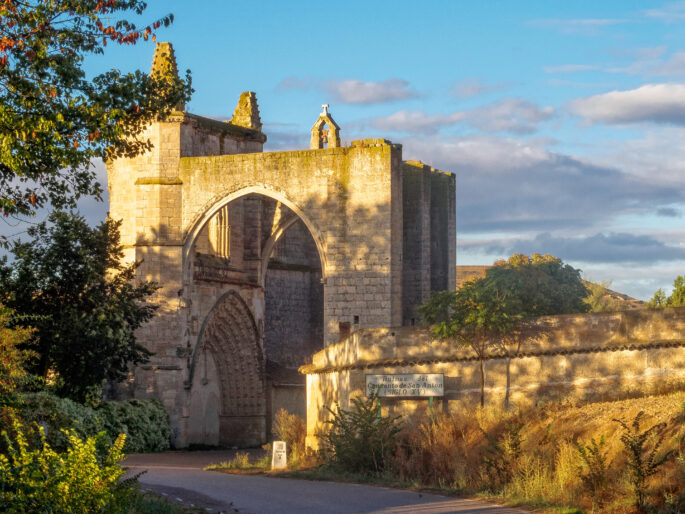
To this last point, where New Age spirituality fails to provide the depth, lineage, or coherent cosmology necessary for lasting transformation, authentic spiritual traditions—particularly esoteric traditions that provide direct access to the experience of the divine—allow us to connect with a transcendent principle without relying on intermediaries. Each of us needs our own direct encounter with the numinous, soul or Spirit; this reflects a broader decentralization that is one of the hallmarks of the incoming Aquarian Age.
People flock to the desert or island paradises for massive, annual festivals such as Burning Man, Wanderlust, or the Bali SpiritFest, following a similar unconscious or conscious call to adventure as those who embark on pilgrimage. The difference is that ultimately, New Age spirituality is more like cotton candy: it tastes great initially but offers little, lasting nutrition. Inevitably, it fails us not because of malintent but because it lacks depth, originates from no established lineage, has not cultivated time-tested legitimacy or authority through peer validation, offers no singular initiatory curriculum, nor a coherent cosmology and mythos. Its sort of a whatever you want goes free for all, that feels liberating, but shortlived. Therefore, I’ve always recommended we turn eventually to authentic spiritual traditions, and rather than internalize their dogmas hook, line, and sinker, make efforts to refine and update them, going back to go forward, making the necessary updates and innovations that keep long-standing institutions like Tibetan Buddhism alive, relevant, and vibrant, no matter what time period or culture it interacts with.
That’s how I see my work and role evolving: to revive the ancient wisdom or mystery schools of old through books and courses while integrating them with modern psychology and neuroscience and to create a community for healing and transformation on the road through sacred pilgrimage.
Ready to Embark?
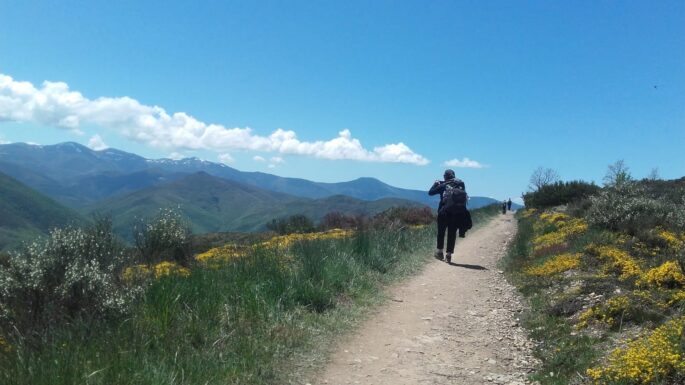
In conclusion, the Kumano Kodo and Camino de Santiago stand as powerful testaments to the enduring human spirit’s quest for meaning, connection, and transformation. These sacred trails offer not just the beauty of nature and rich cultural heritage but also profound opportunities for self-discovery and spiritual renewal. As we navigate an increasingly complex world, these pilgrimages remind us, more and more, of the importance of slowing down, reflecting, and reconnecting with ourselves, others, and what Jung called the Anima Mundi—the enchanted universe—around us. But more than that, pilgrimage is preparing us for the new future, with each step, we learn to face trials on the trails, learning how to adopt the pilgrimage mindset for the ultimate journey of life, death, and rebirth.
Stay tuned for my updates on our mind-bending Kyoto-Koyasan-Kumano pilgrimage with Geshe Tenzin Zopa in a few weeks via my Instagram. Meanwhile, I invite you to join me on the Camino de Santiago in June 2025 with Sacred Earth Journeys or our next tour with Geshe Tenzin Zopa to the Himalayas in October 2025. Whether you seek spiritual awakening, personal growth, or simply the joy of walking alongside fellow pilgrims from diverse backgrounds, these journeys promise to be transformative experiences to enrich your soul. Together, let’s traverse this timeless route, going back, in order to go forward so we can embrace today’s challenges with more resilience and creativity and co-envision a brighter future.
Written and published by Dr Miles Neale originally here.
Dr Miles Neale is a psychotherapist, teacher of Tibetan Buddhism, and pilgrimage guide with twenty-five years of experience integrating science and spirituality. Founder of the Gradual Path for inner and outer journeys, Miles is the author of Return with Elxiir, Gradual Awakening, co-editor of Advances in Contemplative Psychotherapy, and lives in Bali, Indonesia. He is the tour leader on our journey: Walk of Renewal: Camino de Santiago with Dr. Miles Neale taking place in June 2025.
